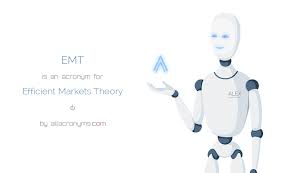The concept of an efficient market is very important in the area of finance. An efficient
market is one in which information is processed in an efficient and rational manner. In an
efficient market each investor’s expectations about security returns are (correctly) based on all information available to that investor. This is usually stated as follows: In an efficient
market, (equilibrium) prices “fully reflect” available information.
The theory and empirical evidence of efficient markets is usually stated in terms of
the behavior of prices over time and of the adjustments of the equilibrium prices to the
release of “new” information. As such, much of the treatment of efficient markets must be
postponed until the models of equilibrium have been developed. Nevertheless, the concept
of market efficiency is so important and so basic to finance that its introduction belongs
here.
The history of the theory of efficient markets dates back at least to the turn of the century when Louis Bachelier, in Theorie de la Speculation (1900), described security prices
by using the equations of Brownian motion. (In fact, this description of the equations of
Brownian motion predates that of Albert Einstein’s development of them in the physical
sciences.) The recent interest in efficient markets which has led to the substantial literature
on rational expectations, among other things, was kindled by the study of security prices
during the late 1950s and early 1960s.
The importance of the theory of efficient markets comes from its predictions about the
aggregation and revelation of the information embodied in the equilibrium prices. That
is, in an efficient market, investors can learn information that they did not already know
by observing the prices of marketed assets. As is usual in economics, we assume that no
trading takes place out of equilibrium. That is, investors observe the equilibrium prices
prior to being committed to their trade contracts. (The mechanism usually assumed to
achieve the equilibrium is the Tatonnement, or “price-contingent,” auction described in
most introductory economics texts.)
This learning can be illustrated most clearly in a riskless economy. There is, however,
a drawback to this approach. Although much of the intuition for efficiency can be gained
by looking at riskless economies, a market is efficient in a riskless economy only if there
are no arbitrage opportunities. Therefore, in this case, the lack of efficiency has an overly
dramatic appearance.
Click here for government certification in Accounting, Banking & Finance





16 Comments. Leave new
very well written.
Informative article !!!
nice article..!
Pretty interesting, got an engineering student to read the article.
Good work! 😀
The article explains the concept of efficient markets very well. But the irony in equilibrium market is that there is never full information about the market and so the expectations can never be correct.
ideal markets are Utopian visions but the concept is well explained.
I agree with Shatakshi’s comment.
Can you tell me what type of arbitrage opportunities lead to inefficiency in markets? Any examples?
Nice article
Good efforts..!
Well explained
nice one
Well written!
EHM doesn’t synchronize the concept of Behavioral Finance
I learned a lot from this article.
commendable work